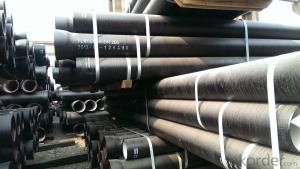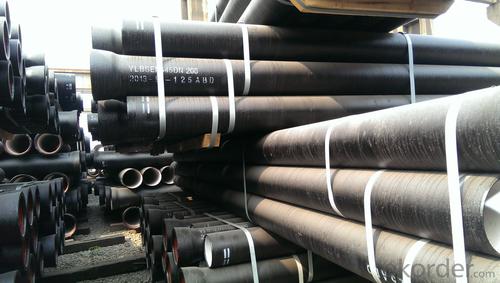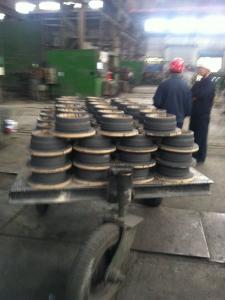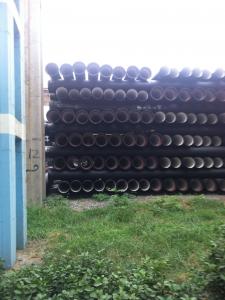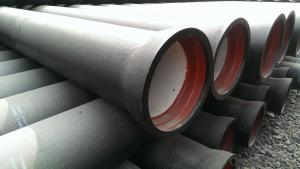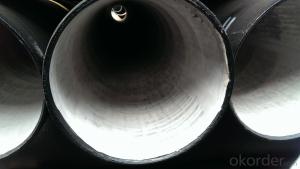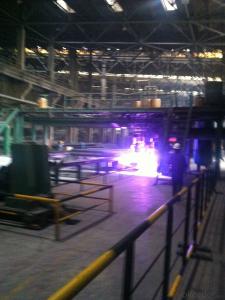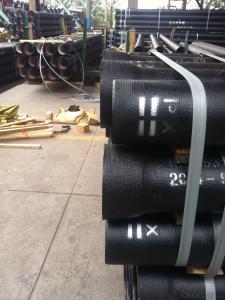DUCTILE IRON PIPES AND PIPE FITTINGS K7 DN450
- Loading Port:
- Tianjin
- Payment Terms:
- TT OR LC
- Min Order Qty:
- 25 m.t
- Supply Capability:
- 30000 m.t/month
OKorder Service Pledge
OKorder Financial Service
You Might Also Like
Material : Ductile Cast Iron
Size Range : DN 80mm to DN 2000mm
Unit Effective Length : 6m or 5.7m
Manufacture Standard: ISO 2531:1998/ EN 545:2006/EN 598:2007
Annual capacity : 200,000 tons
Coating Exterior: Zinc 130g/m2 according to ISO 8179-1 and bitumen coating 70 microns.
Cement Interior: Portland Cement/ High Alumina Cement/ Sulphate Resisting Cement Lining according to ISO 4179
Special requirements on external coating and internal lining can be applied
We also provide accessories such as SBR/EPDM rubber gaskets, lubricant paste, pipe caps, PE sleeves, etc.
Additional Parts:
Each pipe is strictly inspected according to related standard to ensure permanently high performance.
Easy Installation at site and service free for life
Long Service Lifespan
Quotation will arrive you within 24hours once we get your inquiry.
We guarantee offering you a competitive price.
A copy of original inspection reports of pipes will be offered after shipment.
Photos of loading process will be sent to the customer after shipment effect.
We will follow-up the delivery progress after shipment effect and update to the customer on weekly basis.
- Q: How do ductile iron pipes perform in sandy soil conditions?
- Ductile iron pipes perform well in sandy soil conditions due to their inherent strength and durability. The material's high tensile strength allows it to withstand the pressure exerted by the surrounding soil, preventing pipe deformation and breakage. Additionally, the corrosion resistance of ductile iron ensures a longer lifespan, even in corrosive sandy soil environments.
- Q: Are ductile iron pipes resistant to acid attacks?
- Generally, ductile iron pipes exhibit resistance to acid attacks. Ductile iron, a form of cast iron which has undergone magnesium treatment to enhance its strength and ductility, produces a more durable material capable of withstanding corrosive conditions, including acids. Nevertheless, it is crucial to acknowledge that the resistance level may vary depending on the specific acid type and concentration involved. In highly corrosive environments, where powerful acids or high concentrations are present, it may be necessary to implement additional protective measures such as applying a lining or coating to the pipes. Moreover, regular inspection and maintenance are vital to ensure the long-term durability and resistance of ductile iron pipes.
- Q: What are the different methods for tapping ductile iron pipe?
- There are several methods for tapping ductile iron pipe, including hot tapping, mechanical tapping, and electrofusion tapping. Hot tapping involves drilling into the pipe while it is still in service and creating a connection without interrupting the flow. Mechanical tapping uses mechanical equipment to create a threaded or grooved connection on the pipe. Electrofusion tapping uses an electrofusion saddle to create a connection by fusing a fitting onto the pipe.
- Q: Can ductile iron pipe be used for industrial process piping?
- Indeed, industrial process piping can make use of ductile iron pipe. Renowned for its robustness, longevity, and ability to withstand corrosion, ductile iron pipe proves itself as an appropriate selection for diverse industrial functions. It boasts the capability to manage high-pressure systems and commonly finds application in sectors like water and wastewater treatment, oil and gas, chemical processing, and power generation. Moreover, ductile iron pipe offers ease of installation and an extensive lifespan, thus rendering it a cost-efficient choice for industrial process piping.
- Q: Can ductile iron pipes be used in areas with high soil liquefaction potential?
- Ductile iron pipes can be used in areas with high soil liquefaction potential, but certain precautions and considerations need to be taken into account. Soil liquefaction is a phenomenon in which saturated soil temporarily loses its strength and behaves like a liquid during an earthquake or other seismic events. Ductile iron pipes are known for their strength, durability, and resistance to external loads, making them suitable for various applications, including water and wastewater transportation. However, when it comes to areas with high soil liquefaction potential, additional measures should be considered to ensure the pipes' performance and integrity. One crucial factor to consider is the pipe's installation depth. Ductile iron pipes should be installed at a sufficient depth below the ground surface to minimize the effects of soil liquefaction. The depth will vary depending on soil conditions and the level of seismic activity in the area. Consulting with geotechnical engineers and following local building codes and regulations is essential to determine the appropriate installation depth. Furthermore, proper backfill materials and compaction techniques must be employed during the pipe installation process. Using granular materials, such as crushed stone or gravel, for backfill can help improve the soil's stability and reduce the potential for liquefaction. Adequate compaction of the backfill is also necessary to ensure the pipes' stability and prevent settlement or movement during seismic events. Moreover, it is recommended to use flexible joints, such as restrained joints or push-on joints, when installing ductile iron pipes in areas prone to soil liquefaction. These joints allow for some movement and flexibility, which can help absorb the ground's movement during an earthquake, reducing the stress on the pipes and minimizing the risk of damage. Regular inspection and maintenance of the ductile iron pipes are crucial in high soil liquefaction potential areas. Monitoring for any signs of movement, settling, or damage should be conducted, and any necessary repairs or reinforcements should be promptly addressed to ensure the pipes' continued performance and safety. In conclusion, ductile iron pipes can be used in areas with high soil liquefaction potential, but careful consideration of installation depth, proper backfill materials and compaction, the use of flexible joints, and regular maintenance are crucial to ensuring their optimal performance and longevity. Consulting with geotechnical engineers and following local building codes and regulations is highly recommended to ensure the pipes' suitability in such areas.
- Q: Is nodular cast iron pipe filled with Yau Ma Tei?
- In many areas of our country, ductile iron pipe in the middle and small diameter to tube connected with the tube, the bearing type or flange interface method; ductile iron, angle limit must be allowed better seismic performance and sealing performance.
- Q: Is ductile iron pipe breakable?
- 5, inferior wood surface is easy to produce cracks, because its billet is adobe, Adobe porous, Adobe in the process of cooling due to the role of thermal stress, cracks, after rolling, there are cracks;6, poor drainage tube appearance often pitted phenomenon. Pits is due to groove wear caused by defects in pipe surface irregular uneven. Because of the poor sewer pipe manufacturers to pursue profits, often rolling groove rolling most standard.Ductile iron pipes are broken because of the excessive heat treatment during casting or the lack of proper addition in casting to prevent a change in the proper brittleness and to cause cracking. It is recommended that you used to repair defects of cast iron machine, are currently on the market to sell, but also can ensure welding intact appearance, make your products by quality, but if it is in the use of performance can not meet the effect, especially the pipeline pressure quite big, what methods are of no use that must be re cast as the new.
- Q: Are ductile iron pipes suitable for installation in rocky or hard soil conditions?
- Yes, ductile iron pipes are suitable for installation in rocky or hard soil conditions. Ductile iron pipes are known for their strength and durability, making them well-suited for challenging soil conditions. Their high tensile strength allows them to withstand external loads and pressures, including the presence of rocks or hard soil. Additionally, ductile iron pipes are resistant to corrosion, which further enhances their suitability for installation in such conditions. The pipes' flexibility and ability to withstand bending stresses also make them a reliable choice for rocky or hard soil conditions, as they can accommodate ground movement without compromising their structural integrity. Overall, ductile iron pipes are a preferred option for installations in challenging soil conditions due to their robustness, longevity, and resilience.
- Q: What is the weight of ductile iron pipe compared to other pipe materials?
- Compared to other pipe materials, ductile iron pipe typically carries more weight. The weight of the pipe may differ depending on its size and thickness, yet in general, ductile iron pipe is more compact and has a greater weight per unit length than materials such as PVC, HDPE, or steel. The main reason for this increased weight is the composition of ductile iron pipe, which consists of iron and carbon, rendering it a robust and resilient choice for a range of piping purposes.
- Q: Are ductile iron pipes suitable for use in residential plumbing?
- Ductile iron pipes are indeed a suitable choice for residential plumbing. This material, known for its strength and durability, is resistant to corrosion, making it highly advantageous for plumbing systems. With its remarkable tensile strength, ductile iron pipes can endure high pressure and are less prone to cracking or breaking, unlike other materials. Moreover, these pipes are renowned for their extensive lifespan, lasting over 100 years, guaranteeing reliability in residential plumbing systems. Furthermore, ductile iron pipes exhibit exceptional flow characteristics, ensuring efficient water distribution throughout the entire household. In conclusion, the strength, durability, and corrosion resistance of ductile iron pipes render them a fitting and long-lasting solution for residential plumbing needs.
Send your message to us
DUCTILE IRON PIPES AND PIPE FITTINGS K7 DN450
- Loading Port:
- Tianjin
- Payment Terms:
- TT OR LC
- Min Order Qty:
- 25 m.t
- Supply Capability:
- 30000 m.t/month
OKorder Service Pledge
OKorder Financial Service
Similar products
Hot products
Hot Searches
Related keywords
